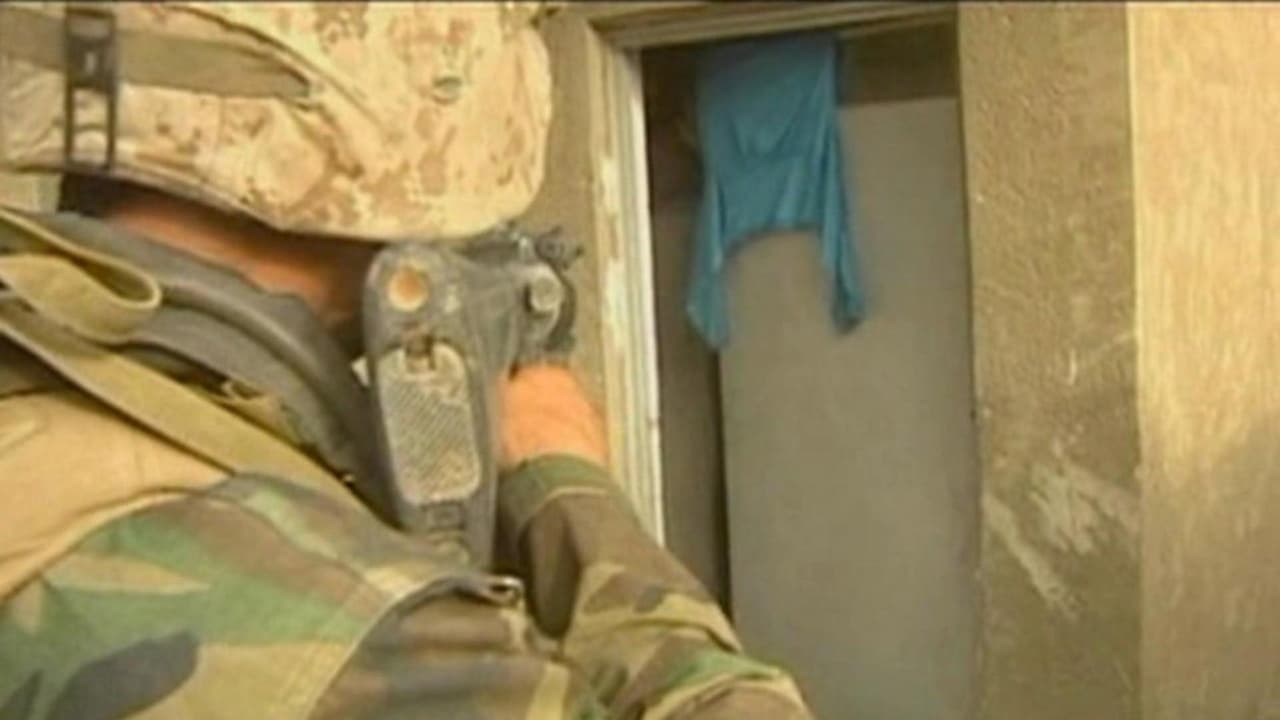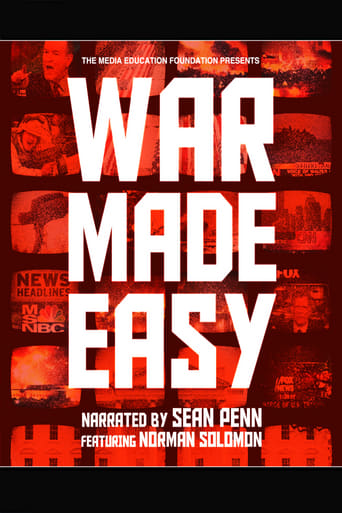

Highly Overrated But Still Good
... View MoreI enjoyed watching this film and would recommend other to give it a try , (as I am) but this movie, although enjoyable to watch due to the better than average acting fails to add anything new to its storyline that is all too familiar to these types of movies.
... View MoreThe film's masterful storytelling did its job. The message was clear. No need to overdo.
... View MoreWhile it is a pity that the story wasn't told with more visual finesse, this is trivial compared to our real-world problems. It takes a good movie to put that into perspective.
... View MoreBasically, Norman Solomon's notion, as presented here covers modern wars from Vietnam to the recent adventures in the Middle East. Here's how the process works.Stage One: The government, led by the president, begins beating the war drums against a perceived enemy. The enemy is manufacturing and storing weapons, is a threat to democracy, is a sponsor of an alien ideology, aims at the destruction of America and possibly world domination. The names used (or, rather, called) are always the same -- "evil," "terrorist or communist," "barbaric", "brutal," "ruthless," and so on. The media reports what the government says. Challengers are marginalized and, since the government is the focus of attention in the press, get much less coverage.Stage Two: The war is launched. And now we can't back out because we must "support the troops" or else we are "unpatriotic." The government controls press access to combat so what we see and read becomes a combination of a Fourth of July fireworks display and a Homecoming football game with everyone rooting for our side. Our high technology weapons are lovingly described. The enemy are faceless.Solomon would certainly agree that nothing is as simple as the picture of "going to war" that I've just presented. We get to see a lot of Norman Solomon. He's a soft-spoken, thoughtful, smart guy and wouldn't be easily bamboozled by simplicity. That's why he wrote the book.There are a couple of things I find myself doubting. He downplays the impact of the press on the public's perception of the Vietnam war. And, in fact, the evidence is that the newspapers were laggard in their understanding. But they did come around. I guess it would be safe to say that they usually DO come around eventually and see the process from a more informed perspective.I don't think anyone can underplay the influence of Walter Cronkite's national broadcast in which he admitted that Vietnam had become a stalemate and it was time to leave. It certainly had an effect on Lyndon Johnson. Solomon is right in arguing that it came a little late in the game, but then it's the job of journalists to report what they know, not their opinion of what they know. At least it used to be that way, before some of the cable news channels became instrumentalized.A few new thoughts occurred to me while watching this. During the Iraq and Afghanistan experiences, the government allowed the media wide access to military operations by "embedding" reporters with selected units. But -- it didn't HELP the public. In a perfectly natural process, the reporters became loyal friends of the soldiers of their units and submitted stories favorable to them. (Imagine: A hypothetical Marine throws away his weapon and runs to the rear. Is the embedded reporter likely to publicize the incident?) There is no surer way to bond people than to subject them to the same stress at the same time. And the enemy remains faceless, distant targets to be shot at or bombed.Some of the comments we hear on the morality of war are also thought provoking. Is it somehow more "moral" for a man to release a load of bombs on a city from ten thousand feet in the air, than it is for a man to strap on a vest full of explosives and commit suicide in the midst of those that HE defines as the barbaric enemy? When our guys commit altruistic suicide they become heroes. Why is it a surprise that when they do it, they become heroes too? Finally, I'll cut these comments short because I don't want to run out of space, and because I've gotten so high on this soap box that I'm beginning to feel the effects of cerebral anoxia. This has nothing to do with the dynamics described by Solomon but I wonder if there isn't something within at least some of us that actually WANTS to go to war and kill others. It's not as stupid as it sounds. Testosterone prompts us to engage in aggression and sexual activity and blood levels vary between individuals and groups. (The level is higher in winning soccer teams.) And differences have been found in the brains of those who are more or less likely to go to war, especially in the region of the amygdala, an almond-shaped organ in the mid-brain that controls the fight-or-flight response. It's bigger in those who are more likely to be militant. You can probably Google it easily enough.Finally, I DO wish we'd all stop using the term "cut and run." War at the top isn't a matter of gonads; it's a matter of brains. I'd suggest that anybody who has survived an elementary school-yard fight should outgrow it -- although I think "cut" can be a perfectly apt term to describe a military withdrawal from an unwinnable situation. It's certainly used routinely on Wall Street -- "cut your losses." The alternative can lead to things like Kamikaze attacks and Hitler's order to "retreat not one millimeter."
... View MoreWar, war, what is it good for... Sing it again. Yeah.Oh, boy.I have a nagging doubt that the Left doesn't really grasp the concept of war at all, or how it relates to humankind, politics, psychology, and just about everything else. The Left has an almost embarrassing way of over-simplifying every single complex issue (while over-complicating the very simple, straight-forward ones), and this they display in abundant quantities in this goofy attempt at a "documentary".But it's interesting that as anti-war as they (allegedly) are, they would never complain if Hugo Chavez or any other Left-wing idol of theirs started a war. War! What is it good for? Absolutely nothing!... Except if it's a conflict initiated by Marxist rebels. Then it's a "good war". This is when killing becomes "necessary" and "acceptable".War! What is it good for? Absolutely everything - like killing Imperialist Capitalist Western swine! Sing it again... Yeah.On a serious note, with a title like this, the Left have once again prevented one of their numerous propaganda films from reaching those whom they wish to convert. As it is, the only people who saw this film were the already converted (i.e. brainwashed). As far as I know, propaganda films are not judged by how they were made - but by how many people of differing views they can reach.Nice try, but no cigar - yet again.To get my extensive "Left-Wing Propaganda in Cinema" list (+comments), email me.
... View MoreThis documentary verbalized everything I have been thinking for years now and some things I didn't even realize I was thinking. It reminded me why I have refused to turn on my television for 6 months in order to avoid being fed disgustingly obvious lies and propaganda day after day. The pattern of propaganda has become so obvious that it amazes me greatly how it has not become blatantly clear to more people. There can almost exist a scientific equation with CNN and other such networks used as its variables as to when the United States government will declare its next war and on what country the war will be declared on. Watching this documentary brought tears to my eyes. They were not tears of sadness. They were tears of disgust. Listening to the way most of the people were talking about the wars and the manner in which they were being fought made me ask myself why we as human beings deserve to continue our existence. Absolute praise to all involved in making this documentary and hope to see more of their fine work."All that is required for evil to prevail is for good men to do nothing." -Edmund Burke ... this evil is not just the "terrorists"
... View MoreNorman Solomon is demonstrating that since World War II the US have systematically used war to defend their own interest and nothing else. So democracy and freedom is a lure for the public to fall into the trap of supporting the wars the President and a small group of people decide. He then demonstrates that all these wars are based on a fundamental and founding lie. Vietnam was based on the lie about the attack of some US battleship by the North Vietnamese in the Gulf of Tonkin just as much as the war on Iraq is based on the lie about the Weapons of Mass Destruction. Then he demonstrates how the press is literally forced into supporting the war though apparently very few are willing not to support it and the vast majority of media people are willing to support these adventures or ventures. But he also demonstrates that only two senators voted against the Gulf of Tonkin resolution in 1964 and only one congresswoman from California voted against the war on Iraq. He demonstrated how civilian casualties are increasingly the only casualties that count as for numbers. From 10% during the first world war they have risen to at least 90% in the war on Iraq. The present count of civilian casualties in Iraq are beyond one million. Then I will quote Senator Morse who voted in 1964 against the Gulf of Tonkin Resolution: "Since when do we have to back our President or should we when the President is proposing an unconstitutional action?" That is clear enough. Democracy does not mean to support the President but to take part in the devising of the US foreign policy itself on the basis of all facts provided to people for them to make up their minds. I will then conclude with Norman Solomon: "When it comes to life and death the truth comes back too late." And in the case of Iraq the truth about the weapons of mass destruction is definitely too late since these WMDs justified a war that had thus no justification since they were a willful lie. And this war led to the most obnoxious and inhumane or even inhuman acts on the side of American GIs, like torturing and killing the victims of their own rapes.Dr Jacques COULARDEAU, University Paris Dauphine, University Paris 1 Pantheon Sorbonne & University Versailles Saint Quentin en Yvelines
... View More